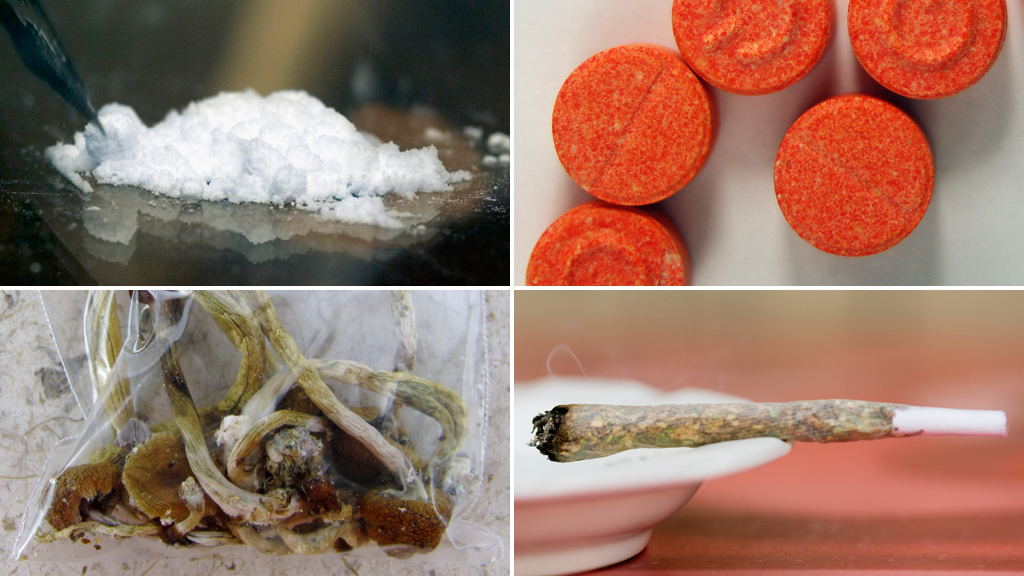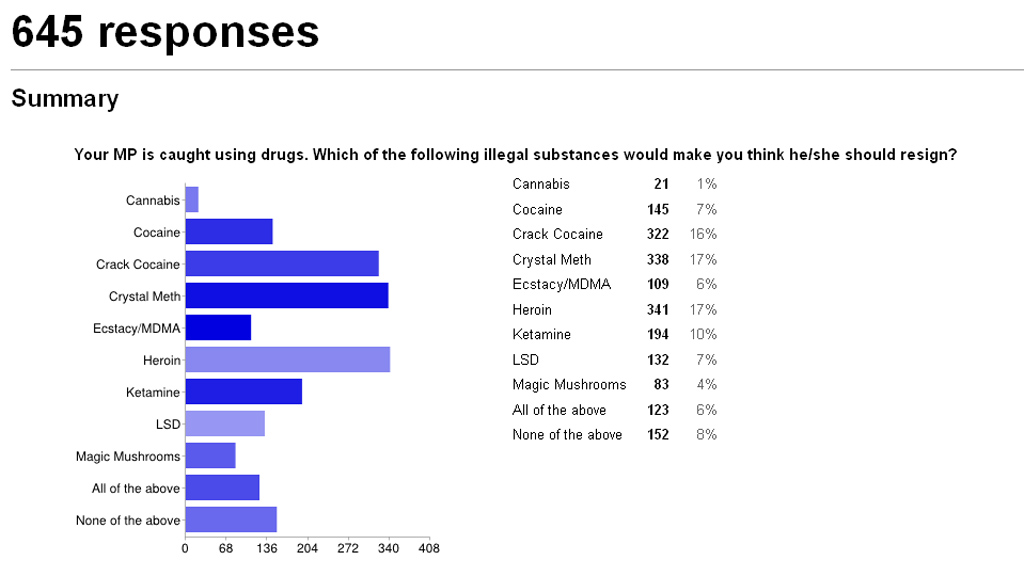Do we care if people take drugs?
From Nigella Lawson to Paul Flowers, major names have been hitting the headlines because of drugs allegations. But has the UK got more relaxed about drugs?

November has seen a number of public figures alleged to have been taking drugs – starting with Mayor of Toronto Rob Ford, who earlier this month admitted he had smoked crack cocaine.
Paul Flowers, the former chairman of Co-operative Bank, was allegedly caught on camera buying drugs, including crystal meth, and then Nigella Lawson, the celebrity chef, was accused by her former husband Charles Saatchi in an email read out in court of having been “off your head on drugs”.
However, whether or not people are condemned for taking drugs is more of a mixed picture.
There seems to be recognition that the criminalisation of people around drug use, particularly around cannabis, is not sustainable. Dr Martin Elvins
A survey by Channel 4 News asked for people’s attitudes if their MP was caught taking drugs (see survey, below).
The poll asked which drugs, if found to have been used by your local MP, would mean you would expect the MP to resign.
Cannabis, cocaine, crack cocaine, crystal meth, MDMA, heroin, ketamine, LSD, and magic mushrooms were all listed. Respondents also had the opportunity to say “all of the above” or “none of the above”.
Out of 645 respondents, 24 per cent said “none of the above” would make them want their MP to resign, whilst 19 per cent said “all of the above”.
Most of concern to respondents were the “Breaking Bad” drug crystal meth, and heroin, with a total (including those who “answered all of the above”) of 72 per cent of respondents saying they would expect their local MP to resign if caught using these drugs.
People were more relaxed about cannabis use, with 22 per cent of respondents saying they would expect their MP to resign if caught smoking pot.

However, from this picture of mixed attitudes is emerging some signs that political and legal attitudes to drugs use, at least at the lower end of the narcotic spectrum, are altering.
On Tuesday, Norman Baker, the recently appointed crime prevention minister, told the Home Affairs Select Committee that the legalisation of cannabis should be considered.
“It should be considered along with anything else,” he said. “That’s not my prime objective and I’m not advocating it at this particular moment.
“What I’m saying is there is a study on, an international comparative study, which is designed to look at all aspects of drug treatment, of drug policy, across various countries and we will follow the evidence and see where it takes us.”
‘More tools’
His words could be seen as a departure from the thinking that saw cannabis reclassified as a class B drug, something that former Home Secretary Jacqui Smith admitted was wrong last year, saying the focus should have been on education, not criminalisation.
Dr Martin Elvins, a lecturer in politics at Dundee University who specialises in drugs policy, told Channel 4 News: “There seems to be recognition that the criminalisation of people around drug use, particularly around cannabis, is not sustainable.”
And Dr Elvins argues, this is also shown in the ways drugs offences are policed.
I think in these cash-strapped times there’s an idea that it (drugs possession) is so far down the public’s list of priorities. Professor Fiona Measham
According to the latest Home Office statistics, there were more than 160,539 recorded offences of drug possession, the majority of which was cannabis, for the 2010/11 year in England and Wales. This compares with 130,395 in 2006/07.
Dr Elvins said: “From 2006/07 to 2010/11 you have got a significant increase in people being arrested for drugs offences.
“But key to this is you have also got an increase in the number of formal warnings and penalty notices. Cannabis is almost certainly the reason for the increased number of offences we have seen, but police are not using the courts in the same way.
“It looks like we have more offences but actually it is because police have more tools to deal with what is going on, on the ground.”
‘Realism’
Professor Fiona Measham, professor of criminology at Durham University who has co-authored a book on the “normalisation” of drugs, argues that different police forces approach drugs in different ways.
“Of course different forces have different priorities,” she said. “I think in these cash-strapped times there’s an idea that it (drugs possession) is so far down the public’s list of priorities.
“Polls suggest that the public prefer the police to prioritise burglars than cannabis users. People are aware that cannabis makes someone a bit dopey and not prone to violence, they know that it’s probably better than someone having eight cans of Special Brew. It is not seen as a policing priority.”
And she added that police approach drug offences with “realism”.
She said: “For some of the police that I have worked alongside in clubs and festivals, their number one priority is to make sure that customers don’t end up in hospital.
“They don’t go around chasing simple possession offences, they have worked out what their priorities are. I think the police are as aware of the situation as the general public and know that they can’t be arresting everyone for everything.”
The Association of Chief Police Officers confirmed to Channel 4 News that the crimes that “exacebate” drug and other crime problems are the priority.
Commander Simon Bray, national policing lead on new psychoactive substances, on behalf of the ACPO drugs portfolio, told Channel 4 News: “Priorities can change and resources may become more restricted in certain areas. For example, the Metropolitan Police is investing new resources to tackle cyber crime.
“At a time when resources overall are under pressure, an investment in one area may mean reducing emphasis on other aspects. However, this may push police forces to progress and innovate eg pressures on forensic budgets have led to improved testing regimes in custody facilities.
“Similarly, at a time when there is more focus on evidence based policing, those drug issues which are shown to be connected with organised crime or which cause or exacerbate crime problems are more likely to be targeted.”
Take the Channel 4 News survey below.
Loading…
-
Latest news
-
As India goes to the polls in the world’s largest election – what do British-Indians think?6m

-
Tees Valley: Meet the candidates in one of the biggest contests coming up in May’s local elections4m

-
Keir Starmer says public sector reform will be a struggle7m

-
Nicola Sturgeon’s husband Peter Murrell charged with embezzlement of funds from SNP1m

-
Ukraine might finally get $60billion in American weapons and assistance to defend against Russia3m

-




